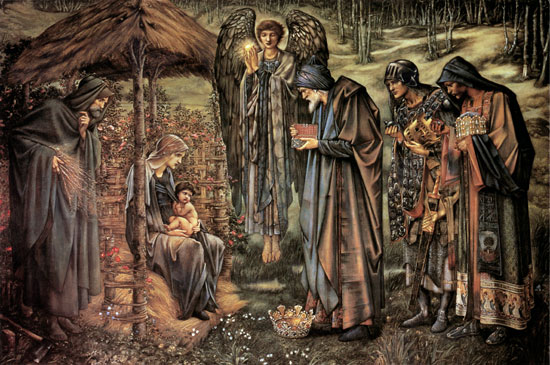
On the eve of the New Year the limit of 2005's blessings and banes, I've been thinking about the star of the Magi. I'm not sure whether it was one of many natural phenomena that have been suggested or a manifestation of the Shekinah glory like the pillar of fire that Israel followed in the wilderness. But the question remains: How did the Magi know to follow the star?
(Gen. 1:14-18) "And God said, Let there be lights in the firmament of the heaven to divide the day from the night; and let them be for signs, and for seasons, and for days, and years:
And let them be for lights in the firmament of heaven to give light upon the earth: and it was so.
And God made two great lights; the greater light to rule the day, and the lesser light to rule the night: he made the stars also.
And God set them in the firmament of the heaven to give light upon the earth,
And to rule over the day and over the night, and to divide the light from the darkness: and God saw that it was good.
And the evening and the morning were the fourth day."
The Magi were practiced observers of all the heavenly bodies they could see. The sun and moon set limits on the day and the night; and all the stars have fixed patterns of motion. It is what God made them for. Suddenly, there appeared a deviation. The terra firma of time and space had been altered. Who wouldn't, given the resources, want to discover the cause of this cosmic change?
But there was more. Something about the timing, placement and motion of the star clued the Magi that this alteration had significance in terms of human kingship, divine visitation, and life-and-death. Their conviction was displayed in their gifts: gold, frankincense and myrrh. They may have guessed this by studying the works of Daniel, who had lived among them centuries before. But they certainly knew it by studying the works of God in the limits of the sky.
Unlike the Magi, my generation has spent enormous energy dissing the value of limits of any kind. What poverty! This generation is no longer able to discern events or changes of importance unless they appear in tabloid headlines wearied with a catalog of detail. The liturgies of nature, courtesy, poetry, human relationships, worship, music, all have ceased to speak to us, because we deny there is a language beyond bare proposition.
My New Year's resolutions this year will have to do with recovering the grammar of limits, learning the steps of the dances all around us that lead us, like Bethlehem's star to the side of the Dayspring. I will look up. The sky's the limit.












